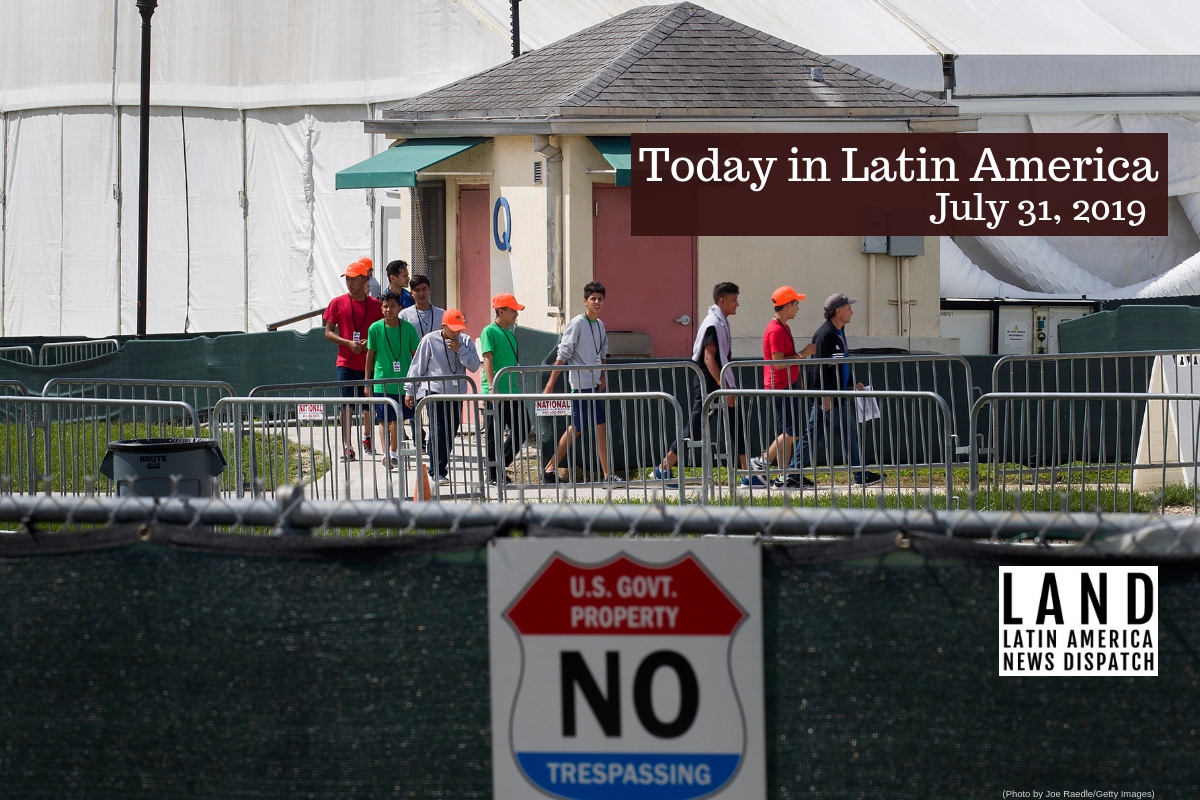

Young people walk the grounds of the Homestead Temporary Shelter for Unaccompanied Children on July 15, 2019 in Homestead, Florida. (Photo by Joe Raedle/Getty Images)
U.S.-MEXICO BORDER: Lawyers working for the American Civil Liberties Union (ACLU) told a federal judge yesterday that the Immigration and Customs Enforcement (ICE) agents have separated 911 children since June 2018, even after a court ordered the Trump administration to halt family separations at the border. The ACLU filing states that “systematic” separations occurred based on minor criminal history, dubious allegations of unfitness, and “errors identifying bona fide child-parent relationships.” Testifying before Congress two weeks ago, Acting Homeland Security Chief Kevin McAleenan said family separations are “extraordinarily rare.”
HEADLINES FROM THE WESTERN HEMISPHERE
NORTH AMERICA
MEXICO: President Andrés Manuel López Obrador has been accused of hypocrisy for vouching for an anti-protest law in southern Mexico. The new legislation that came into effect in AMLO’s home state of Tabasco yesterday features harsh punishments for protests, including prison sentences of up to 20 years for blocking access to businesses and 13 years for impeding work on public works projects. Critics see the law as contradictory since AMLO gained notoriety in the nineties for participating in disruptive demonstrations against the state-owned oil facilities in the Gulf coast state. AMLO said that “order had to be restored” in Tabasco, where the president seeks to complete a new $8 billion refinery in the next four years.
UNITED STATES: The U.S. Senate will leave for a six-week break without approving the Temporary Protected Status (TPS) to Venezuelans after Senate Republicans blocked a bipartisan bill that would have granted asylum protections to Venezuelans based in the United States. “It is an unconscionable moral failing for the Senate not to approve this legislation,” said Sen. Bob Menendez (D-N.J.), one of the bill’s co-sponsors alongside Dick Durbin (D-Ill.). On July 25, the House had passed the TPS bill by a simple majority.
CENTRAL AMERICA
EL SALVADOR: Nicaragua granted fugitive former Salvadoran President Mauricio Funes a citizenship yesterday. The move would block his extradition to El Salvador, an action that current President Nayib Bukele promised to fulfill in his first 100 days in office. Funes has been receiving asylum in Nicaragua since 2016, acknowledging in May 2019 that he has worked as a paid advisor to the Nicaraguan government.
COSTA RICA/PANAMA: A joint operation between Costa Rican and Panamanian police resulted in the disarticulation of a migrant-smuggling ring operating in both countries. Almost fifty people were arrested yesterday, part of a network that spanned across continents that charged between $6,000 to $20,000 to transport migrants from Africa and Asia to the Americas. Costa Rican migration authorities said they raided 36 locations near the borders with Nicaragua and Panamas, arresting 37 people. Federal police in Panama apprehended 16 suspects said to belong to the same international people-smuggling network.
THE CARIBBEAN
CUBA: Price control and austerity measures enacted by the government amid an economic crisis. The official gazette published the decree, which says that all retail and wholesale price increases are banned, except for products imported and distributed by the state where already-set profit margins cannot be increased. In an interview with the Spanish newspaper El País, one unnamed economist called the move an “effective suspension of what is left of the free market,” as the move affects all non-state sectors.
PUERTO RICO: Hundreds of unopened water bottles, intended to be distributed among Hurricane Maria victims, were found dumped in farmland outside of San Juan. Aerial images provided by AFP show the mounds of water bottles packaged into massive bundles, piled up on what appears to be a private estate in the Higuillar neighborhood in Dorado. A spokesman from the Federal Emergency Management Agency (FEMA) confirmed that the water bottles had been provided as disaster relief and “were disposed of after its expiration date.”
PUERTO RICO: According to an official from the incumbent New Progressive Party (PNP), Pedro Pierluisi will be nominated Secretary of State of Puerto Rico; if he is appointed, Pierluisi will become the new governor of the island. The congressional representative would replace in for Secretary of Justice Wanda Vásquez, who said that she is “not interested” and would refuse the position. However, Pierluisi’s candidacy is not supported by Thomas Rivera Schatz, president of Puerto Rico’s Senate who allegedly is interested in succeeding lame-duck Governor Ricardo Rosselló, who will step down on Friday.
SOUTHERN CONE
BRAZIL: During a press conference at the White House, President Donald Trump said he would pursue a United States trade agreement with Brazil, signaling the friendly status of relations between the two biggest economies in the hemisphere. U.S. Secretary of Labor Wilbur Ross will meet with Bolsonaro today in Brasilia. Trump also praised the potential election of lawmaker Eduardo Bolsonaro, the Brazilian president’s son, as the country’s ambassador in Washington, D.C. Legal experts have pointed out that the nomination could run afoul with nepotism rules in Brazilian diplomacy, as it requires Senate approval.
BRAZIL: The government has launched an investigation into a group of miners who killed an indigenous leader in the Amazon during an alleged invasion of protected Wajãpi land, forcing villagers to flee the territory. The murder of Emrya Wajãpi, which took place in the Amapá region on July 23, has been decried by the U.N. as a “worrying symptom of land invasion” in the Amazon. On Monday, President Bolsonaro said that there is “no evidence” on the attack against the Wajãpi tribe chief. Attacks on voluntarily-isolated tribes have been on the rise since Jair Bolsonaro assumed the presidency in 2018. NBC reports that there are over 10,000 illegal miners occupyingindigenous Yanomami land in northern Brazil.


